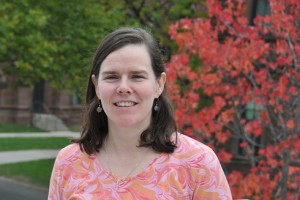Haddad Joins Elite Group of U.S.-Japan Policymakers for D.C. Meeting

Mary Alice Haddad, assistant professor of government, was named a U.S.-Japan Network Fellow and joined an elite group of 14 other scholars and researchers invited by the Maureen and Mike Mansfield Foundation and the Japan Foundation’s Center for Global Partnership (CGP) to join its June Policymakers meeting in Washington, D.C. this month.
The meeting is part of an ongoing effort by the Mansfield Foundation to “build and enhance a network of new generation Japan specialists that can bring diverse expertise and perspectives to he U.S.-Japan policymaking process.”
The U.S.-Japan Network Fellows also provides an invaluable resource for policymakers in Washington regarding U.S-Japan relations in virtually every arena. The two-year program includes travel to Japan to meet with policymakers and researchers there, as well.
“It is really an innovative and fantastic program,” Haddad says. “They picked a superb set of scholars and have done a terrific job of initiating a good network of experts.”
Perhaps the greatest advantage of the meeting was that it provided a forum for academics and others who study and publish work on U.S.-Japanese relations to meet some of the people in the trenches of policymaking and hear about their ideas and challenges.
“It was a chance to talk frankly and off the record with the people who in currently making key policy decisions in the US and Japan,” Haddad says. “We gained insight into their main concerns, hopes and plans. It also marked the connection with these policymakers should we want to contact them later for our research, or should they need some information that we can provide.”
Everyone in attendance agreed the two countries are poised at an exciting moment in their shared histories. Both countries have recently elected new leaders who represent differing political views and perspectives from their predecessors. The U.S. and Japan are also at the forefront of two issues – environmental concerns and nuclear nonproliferation – that are dramatically affecting the world’s political climate.
“My strongest impression was that we are at a watershed moment in US-Japan relations that, if seized by both sides, could not only improve relations between the two countries but transform global politics for the better,” Haddad says. “There was a strong sense by policymakers inside and outside of the government, on the US and Japan sides, that if they can take advantage of this moment great things could be accomplished. Unfortunately, everyone was a bit skeptical that these forward-looking, pro-active policy issues would be able to claim the attention of the top leadership who are usually more reactive and crisis-oriented.”
Haddad believes the experience was extremely beneficial and came away enthusiastic. Not only does see the week of meetings as a success, she also believes they fostered many new relationships and ideas that may prove important in the future.
“No one can predict what will grow from this initiative, but I expect that its effects will reach much farther than any of us expect and will last much longer than the two years of the program.”
Haddad’s research interests include civil society and state-society relations in Japan, and environmental politics in East Asia. She teaches courses related to political science, East Asia, and environmental studies. She has received awards from numerous institutions, including the Harvard Academy, the Mellon Foundation, the Fulbright Program, the National Endowment for the Humanities, East Asia Institute, and Japan Foundation. Her publications include Politics and Volunteering in Japan: A Global Perspective (Cambridge 2007), and articles in journals such as Comparative Political Studies, Nonprofit and Voluntary Sector Quarterly, and Journal of Asian Studies. She is currently completing a manuscript on Japanese democratization.
The Maureen and Mike Mansfield Foundation is a 501(c)3 organization that promotes understanding and cooperation in U.S.-Asia relations. Maureen and Mike Mansfield’s values, ideals and vision for U.S.-Asia relations continue through the Foundation’s exchanges, dialogues, research and educational programs, which create networks among U.S. and Asian leaders, explore the underlying issues influencing public policies, and increase awareness about the nations and peoples of Asia. The Foundation has offices in Washington, D.C.; Tokyo, Japan; and Missoula, Montana.

